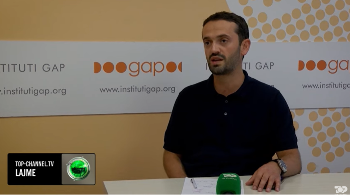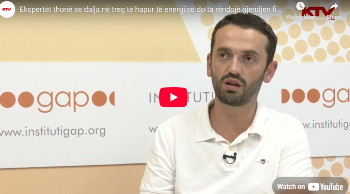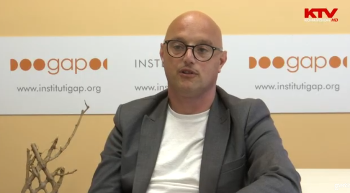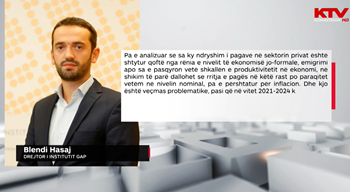GAP Institute has organized a round table on “Independent institutions and agencies: working relationship, salaries, organization and accountability”
12/07/2016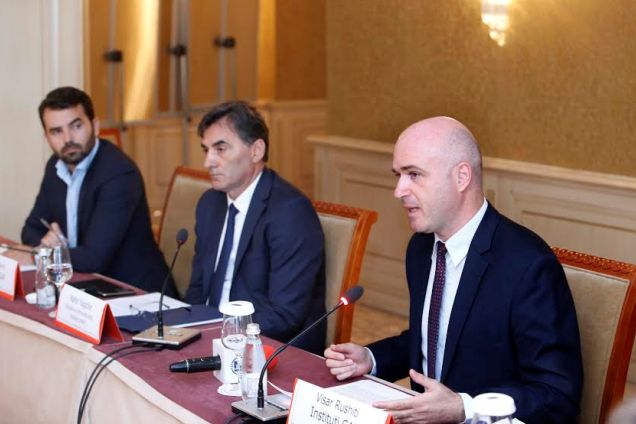
Visar Rushiti from GAP Institute has presented findings of the report which report has been requested from the Ministry of Public Administration (MPA) as information needed to draft the supplement of the Law on state administration to the Law on the organization of public administration. The research has been conducted in 35 independent institutions and agencies established by the Assembly, including the office of the President and Assembly of Kosovo. The four elements which are is focus of the research are: how the working relationship i established in independent institutions and agencies, what schemes of salaries are applied, what is the internal organization of each institution or agency and what about the accountability to the Assembly of Kosovo.
Excluding four institutions such the Energy Regulatory Office, Central Bank of Kosovo, Radio television of Kosovo and Kosovo Pensions Savings Fund, all other institutions and agencies apply the Law on civil service and their employees are classified as civil servants. In relation to the boards or decision-making bodies of these institutions and agencies, the Law establishing the institution or agency serves as the legal basis for the establishment of the working relationship for the board members. Three out of 36 institutions and agencies do not have such bodies, such as Anticorruption Agency, Agency for the Management of Memorial Complexes and Water Services Regulatory Authority. The way how boards are selected and approved is different, however, two models are prevailing: proposal of the board members from the Government and approval by the Assembly and selection based on a public vacancy and approval by the Assembly. In relation to the salaries in these institutions and agencies, salaries of the board members are defined by the Assembly after the proposal from the Committee on Budget and Finances, while the salaries of the civil servants are defined within the framework of the civil service law. The job classification in civil service (catalogue) is in the process of adjustment in many institutions and agencies while a few of them have declared that job classification in civil service is not suitable and applicable. Internal organization in these institutions and agencies is different from case to case and the structure is organized mainly to perform the mandate of the institution. In relation to accountability, most of agencies sent annual reports to the functional Committee in yearly basis and another financial report in the Committee on Budget and Finances. With the exception of one report which may even not have the approval of the Assembly, there are no other methods or ways of reporting or accountability of these institutions and agencies to the Assembly of Kosovo.
The Minister of Public Administration Mr. Mahir Yagcilar stressed the importance of the report as good information which will be used when drafting the supplement of the Law on state administration as well as information needed in other aspects for the public administration reform. Mr. Yagcilar has also stressed the importance of the public administration reform according to the requests of the European Commission and principles of public administration. At the same time, Minister Yagcilar has informed the representatives in this round table with concrete steps in addressing the reform, such as: the strategy on the modernization of public administration, the strategy for a better regulation and the recently approved strategy for the management of public finances. As far as the legal basis is concerned, Minister Yagcilar has presented the plan to move ahead with the package of three laws within the reform: the law on salaries which are realized by the budget of Kosovo, the law which supplements the law on state administration and the law supplementing the law on civil service.
Mr. Felix Rathje from the EU Office has mentioned requirements of the European Commission for the public administration reform and the financial assistance in this regard. Mr. Rathje has also mentioned the large number of independent agencies established by the Assembly as well as agencies which are established as part of ministries. These two elements tell a lot about the fragmentation of public administration in Kosovo. Mr. Rathje has stressed the importance of GAP’s report as a good start and the need for further studies focused on the mandate and competences of these agencies. According to Mr. Rathje, the public administration in Kosovo should be organized to have rationality, be effective and efficient and a depoliticized public administration in Kosovo.
Mr. Hilmi Jashari, Ombudsperson in Kosovo has welcomed the report of GAP and stressed the need for such a report. According to Mr. Jashari, it’s been years now that public administration in Kosovo is fragmented and there exists a different treatment among independent and constitutional institutions which derive from Chapter XII of the Constitution. Mr. Jashari has mentioned the reporting of the independent institutions and agencies to the Assembly by questioning the need to approve or not the report of such independent institutions and agencies in the Assembly. According to him, there should be information delivered to the Assembly for the certain institution’s annual working process and performance, but not a formal approval. Mr. Jashari has also mentioned the lack of budget for the Ombudsperson Institution and the confusion which exists among the Government and the Assembly in addressing this issue. Mr. Jashari has also informed the representatives of this round table about the request submitted to the Constitutional Court to give an interpretation if the application of the job classification in civil service (catalogue) is a violence of the independency of the independent and constitutional institutions.
Mr. Fehmi Pireva, coordinator from the Assembly with independent institutions and agencies has mentioned a number of challenges which are faced by these independent institutions and agencies. According to him, 16 out 36 agencies are accommodated in private locations and pay rent in monthly basis. Mr. Pireva has explained the decrease of institutions and agencies in Albania and the establishment of a Directorate in the Assembly which would be monitoring these institutions and agencies. According to him, in Albania there exist a number of 16 independent institutions and agencies, 5 constitutional and 11 agencies. A number of other representatives have contributed to the debate from the civil society and other institutions and agencies.
Please click HERE to read the full report.








